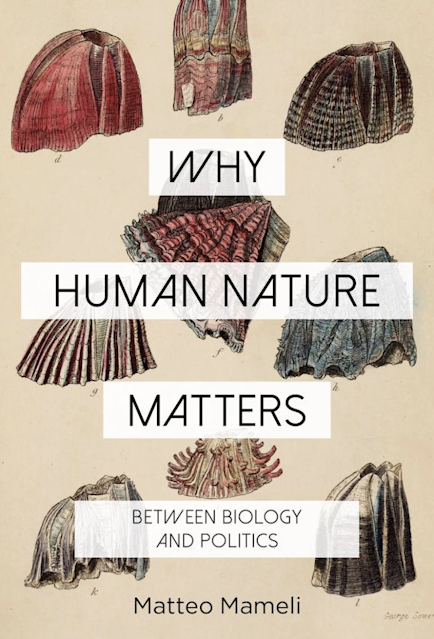We celebrate Darwin Day (12th February) with a post by Matteo Mameli (King’s College London) on his new monograph, Why Human Nature Matters: Between Biology and Politics (Bloomsbury 2024). In the book, Mameli discusses Darwin’s views on mental faculties, human differences, and the transformative agency of organisms.
My monograph addresses classic and contemporary perspectives on human nature and makes a novel proposal, one that stresses the biological and political significance of human diversity and mutability. Darwin’s ideas on variation and niche construction play an important role in my argument, which also draws on insights from Marx, Engels, Gramsci, Sebastiano Timpanaro, Sylvia Wynter, and others. The cover image is a plate from one of Darwin’s books on barnacles. To discover why Darwin was so interested in barnacles, you will have to read the book!
Below are some excerpts from the introductory chapter:
Organisms inherit genetic material from their parents, but they also inherit the outcomes of the choices and activities of their conspecifics and non-conspecifics. […] In relation to changes in their conditions of life, both internal and external, corporeal and extracorporeal, organisms are both subjects and objects, agents and patients, sources as well as recipients of change. […] Human niche construction has profoundly transformed both humans and the rest of nature, with the pace of transformation continually accelerating. Finding the right way to grasp the similarities and differences between human niche construction and the niche-constructing processes of other species is of utmost importance.
In the current epoch of genetic and molecular engineering, anthropogenic climate change, and ecological collapse, the human planetary footprint is becoming every day more evident. Will we destroy our conditions of life and cause our own extinction? Will we bio-engineer our bodies and those of other living organisms? Will we geo-engineer Planet Earth? Will we be able to remove the barriers that separate us and other terrestrial beings from better modes of life? Will we revolutionize our praxis? If so, in what ways?
The elaboration, modification, and spread of ideas about human nature is a part of human praxis that shapes other parts of human praxis and that, by doing so, conditions the ways we live, including the ways we organize and reorganize our social systems and our interactions with the rest of nature. Symbols can be causally powerful, including those symbols with which we humans think about ourselves as members of a species. […] A view that draws attention to the ways in which human nature can mutate is better than an eliminativist approach. However, for a view of human nature as mutable through praxis to work, one needs to acknowledge not just the transformative impact of human praxis but also its concrete materiality. We need to avoid seeing human nature as something rigid and unchangeable; at the same time, we need to reject any “attenuation of materialism.”
In Part One of this book, I explore various classic perspectives on human nature, featuring ideas from Aristotle, Augustine, Hobbes, Rousseau, Marx, Engels, and others. The discussion shows how debates about human nature are often debates concerning the ways humans can or cannot cooperate and the ways our nature enables or constrains the social production (and reproduction) of valuable human goods and relations. Ideas about human nature often have a profound influence on how we continuously recreate and govern our modes of life.
In Part Two, I make an intervention in contemporary discussions on the concept (or notion, or conception) of human nature. This part of the book criticizes various proposals concerning how we should think about human nature in abstract terms, and it makes an alternative proposal—one that focuses on plasticity, diversity, and transformative processes. In today’s context, ideas about human nature cannot be isolated from evolutionary biology and the sciences of human biocultural differences, as long as these sciences are understood in fully niche-constructionist terms. At the same time, a good way of thinking about human nature needs to consider the role played by ideas about human nature in social conflict and in structuring our modes of life.
In the Conclusions, I revisit Timpanaro’s critique of Gramsci’s attenuated materialism and the general issues concerning human nature, human modes of life, and the embeddedness of human praxis.
